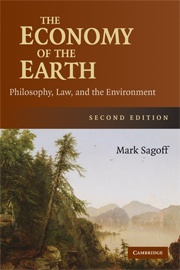Book contents
- Frontmatter
- Contents
- Acknowledgments
- 1 Introduction
- 2 At the Shrine of Our Lady of Fatima or Why Political Questions Are Not All Economic
- 3 The Allocation and Distribution of Resources
- 4 Values and Preferences
- 5 Can We Put a Price on Nature's Services?
- 6 Do We Consume Too Much?
- 7 Is an Environmental Ethic Compatible with Biological Science?
- 8 Settling America or the Concept of Place in Environmental Ethics
- 9 Natural and National History
- 10 Environmentalism: Death and Resurrection
- Notes
- Index
10 - Environmentalism: Death and Resurrection
Published online by Cambridge University Press: 05 June 2012
- Frontmatter
- Contents
- Acknowledgments
- 1 Introduction
- 2 At the Shrine of Our Lady of Fatima or Why Political Questions Are Not All Economic
- 3 The Allocation and Distribution of Resources
- 4 Values and Preferences
- 5 Can We Put a Price on Nature's Services?
- 6 Do We Consume Too Much?
- 7 Is an Environmental Ethic Compatible with Biological Science?
- 8 Settling America or the Concept of Place in Environmental Ethics
- 9 Natural and National History
- 10 Environmentalism: Death and Resurrection
- Notes
- Index
Summary
An editorial in The Economist magazine quipped that the environmental movement borrows its underlying narrative from Christian thought. “There is a Garden of Eden (unspoiled nature), a fall (economic development), the usual moral degeneracy (it's all man's fault), and the pressing sense that the world is enjoying its final days (time is running out: please donate now!).” The global economy, at least in comparison to the past, however, seems to be booming. Environmentalism may be in its Last Days. As one commentator put it, “Secular apocalypticism appears devoid of an underlying redemptive meaning and is thus characterized by a sense of hopelessness and despair.” The “Death of Environmentalism” is much discussed. Why has the environmental movement, which waxed as a political force in the 1970s, waned today?
THE CONDITIONS OF RELIGIOUS EXPERIENCE
In the Varieties of Religious Experience, William James wrote that religious belief expresses the conviction “that there is an unseen order, and that our supreme good lies in adjusting ourselves thereto.” Religious experience also arises from the human sense “that there is something wrong about us as we naturally stand. The solution is that we are saved from that wrongness by making proper connection with the higher powers.”
The science of ecology for over a century has lent support to these beliefs. First, ecologists have held that an unseen order is to be discovered in biotic communities – that “there is a reality to community structure and there is a dynamic stability … a highly significant underlying element of organization and constancy [that persists] over hundreds of thousands or millions of years.”
- Type
- Chapter
- Information
- The Economy of the EarthPhilosophy, Law, and the Environment, pp. 194 - 208Publisher: Cambridge University PressPrint publication year: 2007

